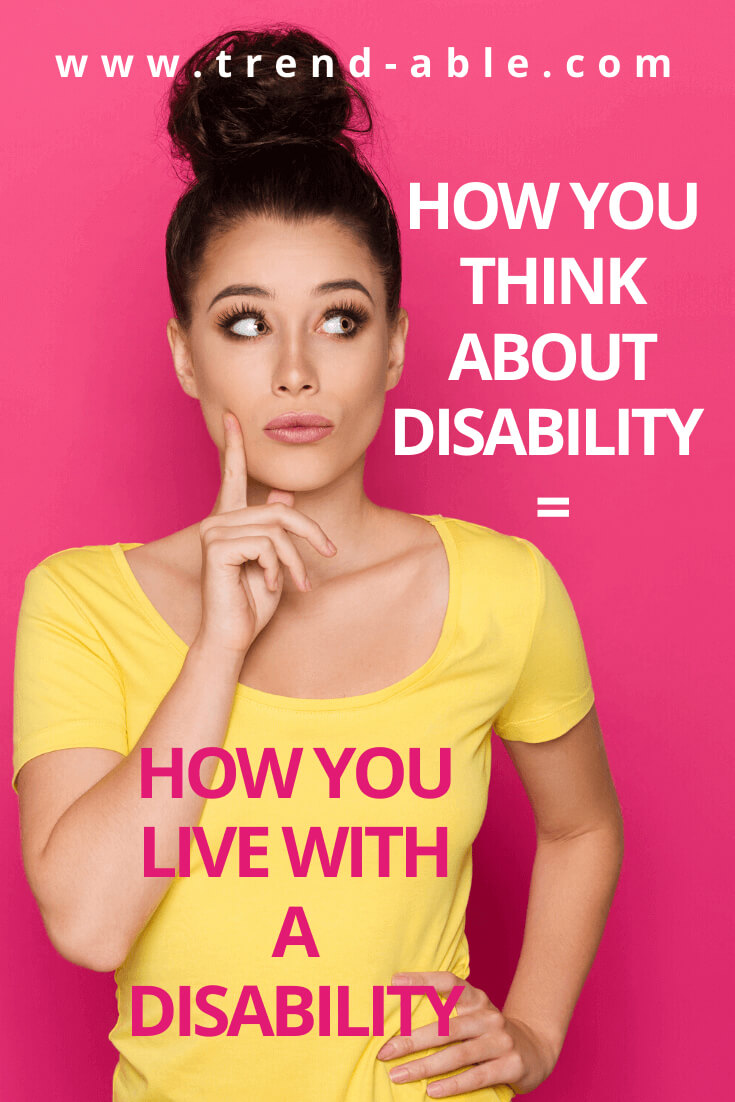10 THINKING TRAPS WHEN YOU HAVE A DISABILITY
Did you know that each day the average person has about 60,000 thoughts? Some researchers say that this number is actually closer to 100,000. Although math isn’t exactly my strong-suit (My kid’s stopped asking me for help with their math homework after 4th grade), I’m thinking that irregardless of the exact number, our brains are really busy. I know mine’s been working overtime ever since my kids became teenagers.

It’s not surprising that researchers found that of the thousands of thoughts we have each day, 80% of them are negative and 95% of them are repetitive. Basically, this means that the majority of us tend to focus on the negative and ‘play the same songs’ in our heads, (like Groundhog Day) day after day.
This is especially true for people with disabilities. I have no scientific data to back this, but if you’ve spent any time scrolling through some of the online “support groups” for people with chronic conditions, you can probably concur that there’s a whole lot of negativity being spewed.
Of course there’s typically a handful of the same people posting redundant & exaggerated comments like, “No-one understands me!” and “This disease is ruining my life!”. I am not judging (well, sort of) and I get people’s need to vent and get validation from others, but this negativity only serves to make things worse. Do you agree?
Most negativity stems from what therapists refer to as “thought distortions or “cognitive distortions”.
SO, WHAT ARE THOUGHT DISTORTIONS

Thought distortions (also called cognitive distortions) are negative thoughts that are exaggerated, irrational, skewed, and/or distorted. All of us have them at times and they manifest from our unconscious perceptions & deep seated beliefs.
These thought distortions can create anxiety, depression, anger, low self-esteem and relationship problems. They’re basically your mind playing tricks on you; convincing you that you’re not as good as everyone else, people don’t like you, you’re at fault, things are hopeless, or other negative beliefs. The problem is that these cognitive distortions are very convincing.
But our thoughts are not facts. We can choose to challenge them & to ultimately change them. But first we have to know what they are. Below is a list of 10 common cognitive distortions & examples of how they may show up in people with disabilities.
1. ALL-OR-NOTHING THINKING

You see things in black-and-white with no shades of gray. Things are either great or horrible; You think you are either beautiful or ugly.
Example: You spill coffee on your shirt and think, “My hands suck and I can’t do anything right!”
2. OVERGENERALIZATION

You view a single negative event as a never-ending pattern of defeat by using words such as “always” and “never” when you think about it.
Example: You have a flare & think, “I’ll never feel like myself again.”
3. FILTERING

You dwell on the negatives and ignore or discount any positives. You look for evidence that supports your negative thoughts.
Example: You make progress at physical therapy and think, “Big deal! A kindergartner can do that; I still can’t walk like I used to.”
4. MIND READING & FORTUNE TELLING

You assume you know what people are thinking (mind-reading) without having any evidence or proof to back it up. You have a tendency to make negative predictions (fortune telling) based on little or no evidence and hold them as gospel truth.
Examples: “They are staring at my leg braces and judging me.” “There’s no way anyone will want to marry me with this disease”.
5. CATASTROPHIZING

You tend to blow things out of proportion. You jump to the worst possible outcome after a seemingly minor setback. Every upsetting situation feels like a major crisis.
Example: You have a stomach ache and think, “With my luck it’s probably Cancer!”.
6. SHOULDING

You criticize yourself or other people using words like “should”, “must”, “ought”, and “have to”.
Examples: “I should lose weight” or, “You should do the Keto diet for your inflammation!”
7. PERSONALIZATION

You take virtually everything personally, even when something is not meant in that way. You tend to compare yourself to others. You may also see yourself as the cause of some negative external event, which in fact you were not primarily responsible for.
Example: “She’s probably annoyed because I can’t walk as fast as her”.
8. BLAMING

The opposite of personalization, You hold others responsible for your emotional pain.
Example: “I shouldn’t have listened to you & gone to that party, I am in pain”.
9. LABELING

You identify yourself with your shortcomings without being open to subsequent evidence suggesting you aren’t that way.
Example: Instead of saying, “I need some help getting dressed” you tell yourself, “I am helpless”.
10. EMOTIONAL REASONING

You assume that because you feel a certain way that it must be true.
Example: “I feel like a burden, so I really must be one.” Or “I feel ashamed, this proves I am defective ”
Conclusion:

Now that you know some of the most common thought distortions experienced by people with disabilities, you can identify & challenge them when you think them.
The key is really to become mindful of how you speak to yourself and stop the negativity at the first thought. Remind yourself that your assumptions are not based on actual facts, they are just negative beliefs.
Some questions you can ask yourself in the moment are, “Is this 100% true?”, “Have I gotten through worse?”, “Is there any evidence to support my negative thinking?”. “Is it possible that I may be jumping to conclusions? “
When you have a disability there are a lot of things that feel (and are) out of your control, but you are the driver of your own mind and can alter it’s direction.
It goes without saying (but I’ll say it anyhow so no one sues me) that although I have a masters in social work, I am not giving any medical or professional advise here on Trend-Able in that capacity. I’m just a blogger with a disability. If you are depressed and/or unable to manage your negative thoughts on your own, please seek the help of a therapist. Ok?
I hope you enjoyed this post and learned something new. I would love to know your thoughts! Please leave a comment in the box below & let us know what resonated with you. If you’re not already a part of our perfectly imperfect tribe, please subscribe here. You’ll be notified of new posts (no spam) and receive our cool newsletter.
Please listen to my latest podcast on this subject… Embrace It: Episode 17 – How to Stop “Shoulding” Yourself & 9 Other Harmful Thinking Traps!
Xoxo
Lainie






Great post. I really related to the one about filtering. When I improve I complain mentally that I’m not as good as I used to be. I’m working on improving my thinking, and this is helpful. I also like seeing others with the same problems as me.
Hi Diane,
Thanks so much for reading and commenting. I get it I do that as well and it’s a work in progress!
Thank you so much for this!
Thank you so much for reading!?
I was in a group that had all of the things you have mentioned. It was for people with borderline personality disorder. It was very good and helped me tremendously! I believe this is beneficial to all people not just people with disabilities! You might try telling people how to apply these to our every day life.
Lori,
Thanks for your comment! I think that’s a great idea for a post during this time. Yes, DBT therapy definitely helps people with Borderline Personalities & those of us (me included) who have those tendencies.
I’m definitely in every place you mentioned. Having a really hard time after losing my career. But this article shined a ray of light for me because now I know I’m not the only one going through these thoughts! I have been working through these thoughts and it is an uphill battle….literally feels like me not being able to walk up a hill anymore. I’m staying positive that my progress and good days will start to outweigh the negative days soon! Thank you and I’m so glad I found your site!
I’m so glad you found it & me too! This sucks for sure & I’m so sorry about your job. Sending positive vibes your way. It will get better.
Oh Lainie, thanks so much for sharing and reminding us that everyone has ‘bad’ days but even those of us with disabilities have the strength and ability to turn our thinking around. You are a constant inspiration to help us through those ‘bad’ days. Thank goodness for you!! – Now I need to go look at shoes…?
Michele,
You comment this Sunday morning made me smile. Thank you !! I truly appreciate it & yes, go shop!1
Such valuable info and reminders, thank you! I have to remember this when I have a cascade of CMT related stuff (can’t button something, too weak to hold a glass with one hand, walking extra weird) and feel helpless.
I have CMT1A, Autonomic Neuropathy, and Reynaud’s. For me the greatest coping mechanism is humor. I had a friend see my afos and call me “legacy” Dont know why but I was having a crap day and it made me laugh. Now I’m called “legacy” all the time. ? I also have Reynaud’s and my children constantly refer to my hands and feet as “zombie feet/hands” In return I love to freak them out by randomly placing said cold appendages on the back of their necks. ?
Lainie!! I loved this ! I do feel like we have to keep our thoughts totally positive especially with a disability! #4 I struggle with! Thank you! Such great tips to keep us going 🙂
Hi Cindy,
You’re the best for always reading ?. Yeah, I struggle with that one the most too!
When you show your trendy shoes thAt you say fits the AFOs the person showed wearing the shoes don’t wear a AFO brace??????
Charlotte,
Thanks for your comment. I wear a carbon fiber Afo. I am unable to purchase & photograph hundreds of shoes . They are recommendations based on 25 + years of knowledge & experience. I don’t sell them & it’s trial & error for all of us but the shoes have similar characteristics (like removable footbeds etc) that makes them more likely to fit an afo
I love “…….you are the driver of your own mind and can alter your direction….”! Thank you, Lainie, for another wonderful blog on changing our perspective! ❤️
Interesting points and a few here I agree I do a lot of, especially ‘shoulds’! Really good reminder that we need to be mindful of how we’re thinking and why, that sometimes the thought processes we’ve come to develop are actually doing us (and sometimes others too) a disservice.
Caz xx
I loved this post and totally agree that our thinking is in our control. Lainie, thank you for all that you do,